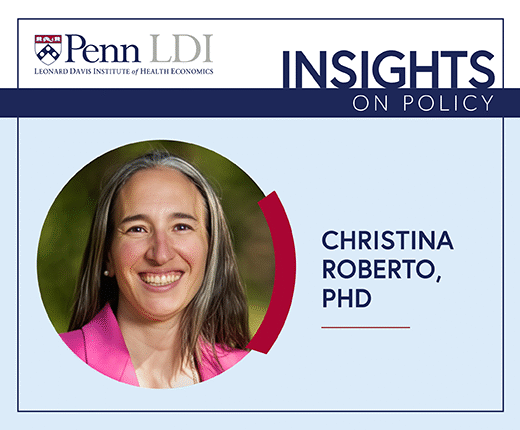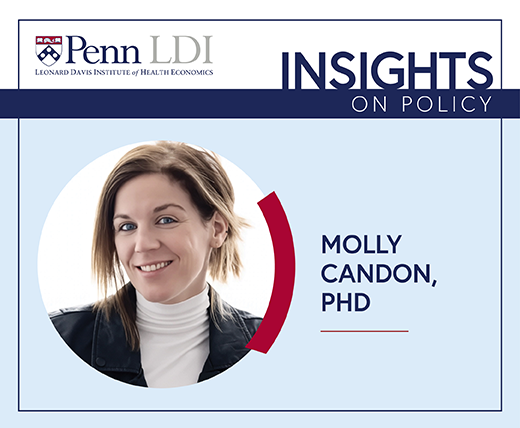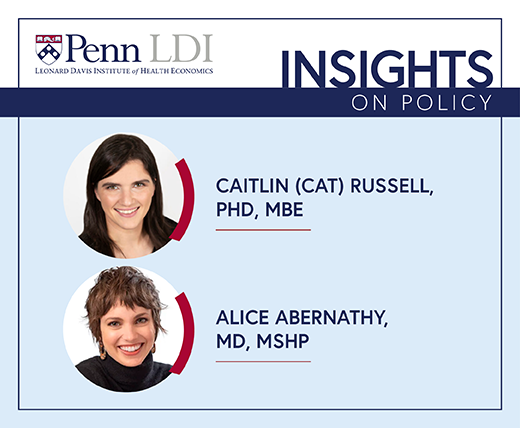
Employment Protections for Individuals Experiencing Menstruation, Perimenopause, or Menopause
Testimony: Delivered to Philadelphia City Council’s Committee on Labor and Civil Service
Substance Use Disorder
Policy

In May 2025, LDI Senior Fellow Jeanmarie Perrone, MD testified before the Philadelphia City Council’s Kensington Caucus in a meeting convened to explore best practices in substance use disorder outreach and to investigate the effectiveness of current methods used by the City of Philadelphia and its partners.
The testimony focuses on the importance of outreach to individuals with substance use disorder to meet people where they are—on sidewalks, in encampments, in shelters, and in the emergency department for the purpose of building trust, offering harm reduction tools like naloxone, xylazine and fentanyl test strips, reassuring patients about withdrawal management and creating a human connection that can lead to treatment.
Views expressed by the researchers are their own and do not necessarily represent those of the University of Pennsylvania Health System (Penn Medicine) or the University of Pennsylvania.
Testimony on council resolution:
Outreach in Opioid Use Disorder Treatment – Philadelphia
Jeanmarie Perrone, MD FACMT
Professor, Emergency Medicine, Medical Toxicology and Addiction Medicine Initiatives Director, Center for Addiction Medicine and Policy
University of Pennsylvania
Good afternoon, and thank you for the opportunity to speak.
My name is Dr. Jeanmarie Perrone, and I serve as the Director of the Center for Addiction Medicine and Policy, a model center for opioid use disorder treatment, at the University of Pennsylvania. As an emergency medicine clinician and researcher, I’ve spent the past 2 decades preventing opioid addiction and optimizing access to treatment for patients with opioid use disorder—especially from our emergency departments but also, enhancing primary care and in hospital substance use treatment. We advocate for a peer led medication model; and what we know, both from data and experience, is clear: outreach is not optional. It is essential.
Philadelphia has one of the highest overdose death rates among major U.S. cities. But those numbers only tell part of the story. Behind every statistic is a person—many of whom are disconnected from care, unsure where to turn, or distrustful of healthcare systems. In Philadelphia, our patients are not just challenged by fentanyl, but by emerging adulterants including xylazine-associated wounds and severe fentanyl-medetomidine withdrawal leading to overwhelming fears of treatment and an endless cycle of continued use.
Outreach shifts that paradigm to meet people where they are—on sidewalks, in encampments, in shelters, and in the emergency department. Outreach is more than handing out information. It’s about building trust, offering harm reduction tools like naloxone, xylazine and fentanyl test strips, reassuring patients about withdrawal management and creating a human connection that can lead to treatment—whether that’s buprenorphine, methadone, or long-term recovery support.
In neighborhoods like Kensington and South Philadelphia, outreach workers in low barrier settings such as wound care or mobile vans are often the first and only point of contact for someone using opioids. At our center, we’ve seen that individuals referred through outreach are more likely to engage in care and stay in treatment—because their first encounter was grounded in respect, not judgment.
Outreach is a clinical extension of care. It saves lives, reduces emergency visits, and helps people stabilize—not just medically, but socially and psychologically. But for it to work, it needs sustained investment: in personnel, training, infrastructure, and coordination across health systems, community partners, and city agencies.
The opioid crisis cannot be solved from the emergency department or clinics. We must go to the people who need us most. That’s the power of outreach—and it must be at the heart of Philadelphia’s strategy moving forward. Thank you.

Testimony: Delivered to Philadelphia City Council’s Committee on Labor and Civil Service

Testimony: Delivered to Philadelphia City Council’s Committee on Labor and Civil Service

Comment: Delivered to the National Center for Complementary and Integrative Health

Comment: Submitted to the U.S. Department of Veterans Affairs

Comment: Delivered to the U.S. Department of Labor

Memo: Delivered to the U.S. Food and Drug Administration (FDA)